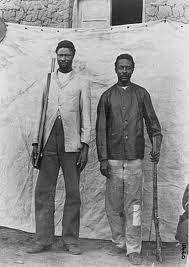
Samuel and Julius Maherero, leaders of the Herero rebellion against German imperialism in 1904. The Germans, in retaliation, killed 60,000 Africans and enslaved many more for over 80 years., a photo by Pan-African News Wire File Photos on Flickr.
Nama-Herero skulls receive heroic welcome
Wednesday, 05 October 2011 00:00
WINDHOEK. - Thousands of Namibia's ethnic Hereros and Namas gave an heroic welcome yesterday to 20 skulls of their ancestors returned from Germany, where colonial authorities had taken them a century ago.
About 4 000 people stood on the tarmac at the capital Windhoek's international airport, where the plane carrying them home landed at sunrise to ululating women and men shouting battle cries amid banners reading "welcome to our ancestors, our heroes".
At the far end of the runway, two caskets covered with the Namibian flag were taken out of the plane by officers of the Namibia Defence Force, flanked by an honour guard and accompanied by a trumpet salute.
As the caskets were loaded into a military vehicle, a small group of Herero men drew closer, calling to their ancestors and welcoming them home.
"Our people cry tears as our grandmothers and grandfathers are back on their home soil," said Herero chief Kuiama Riruako.
Riruako was part of the 60-member Namibian delegation that flew to Germany at the end of September to receive the skulls at the Charite University hospital in Berlin.
Namibian Prime Minister Nahas Angula and several cabinet ministers welcomed the return of the skulls.
"These mortal remains are testimony to horrors of colonialism and Germany's cruelty against our people," Angula said. "The Namibian nation accepts these mortal remains as a symbolic closure of a tragic chapter."
Lutheran Bishop Zephaniah Kameeta who was part of the delegation said during the sermon at a church service before departing for Germany, "Our journey to Germany to repatriate our ancestors is a divine mission.
They were forcefully removed in an undignified way."
Namibia's former ambassador to Germany, Peter Katjavivi, said the "repatriation of the skulls is an essential component of regaining our past, and consequentially our dignity."
For Festus Muundjua, a respected Herero historian, the skulls' return is "part of the decolonisation process of Namibia."
"We can only forgive and reconcile if we sit down and talk to each other, but the German side is not prepared to talk," he said.
Ida Hoffman, a Nama-speaker and former parliamentarian, said the return of eventually all the skulls does not close this sad chapter.
"There must be reparation as a matter of justice," she said. However, Germany has ruled out reparation.
For many, the journey to Germany will have deep personal significance. One of the Nama chiefs, David Frederick, hopes to find out if the skull of his great-grandfather, chief Cornelius Frederick is there, Hoffman said.
"Like the Nama-chief, many of us are looking for information about ancestral family members," Hoffmann told AFP.
The skulls are among an estimated 300 taken to Germany after a slaughter of indigenous Namibians during an anti-colonial uprising in what was then called South West Africa, which Berlin ruled from 1884 to 1915.
Incensed by German settlers stealing their land, cattle and women, the Herero people launched a revolt in January 1904 with warriors butchering 123 German civilians over several days. The Nama tribe joined the uprising in 1905. The colonial rulers responded ruthlessly and General Lothar von Trotha signed a notorious extermination order against the Hereros.
Rounded up in prison camps, captured Namas and Hereros died from malnutrition and severe weather.
Dozens were beheaded after their death and their skulls sent to German researchers in Berlin for "scientific" experiments.
Up to 80 000 Hereros lived in Namibia when the uprising began. Afterwards, only 15 000 were left. - AFP/ timeslive.co.za.
No comments:
Post a Comment